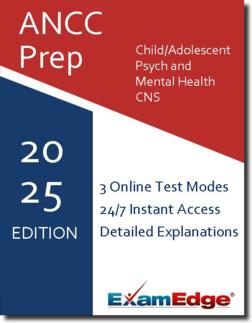ANCC Child/Adolescent Psych and Mental Health CNS (PMHCNS) Practice Tests & Test Prep by Exam Edge - Topics
Based on 34 Reviews
- Real Exam Simulation: Timed questions and matching content build comfort for your ANCC Child/Adolescent Psych and Mental Health CNS test day.
- Instant, 24/7 Access: Web-based ANCC Child/Adolescent Psych and Mental Health CNS practice exams with no software needed.
- Clear Explanations: Step-by-step answers and explanations for your ANCC exam to strengthen understanding.
- Boosted Confidence: Reduces anxiety and improves test-taking skills to ace your ANCC Child/Adolescent Psych and Mental Health CNS (PMHCNS).

Understanding the exact breakdown of the ANCC Child/Adolescent Psych and Mental Health CNS test will help you know what to expect and how to most effectively prepare. The ANCC Child/Adolescent Psych and Mental Health CNS has 150 multiple-choice questions The exam will be broken down into the sections below:
| ANCC Child/Adolescent Psych and Mental Health CNS Exam Blueprint | ||
|---|---|---|
| Domain Name | % | Number of Questions |
| Advanced Practice Mental Health Nursing: Provision of Care | 49.33% | 74 |
| Professional Role | 25.33% | 38 |
| Scope and Standards of Practice | 16% | 24 |
| Organizations/Health Systems | 9.33% | 14 |


